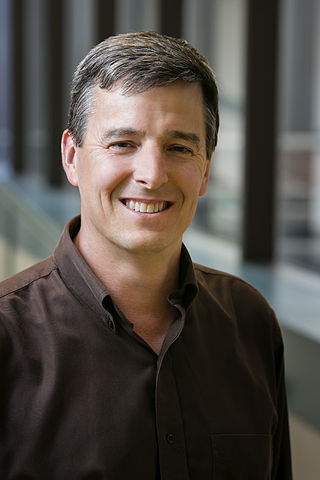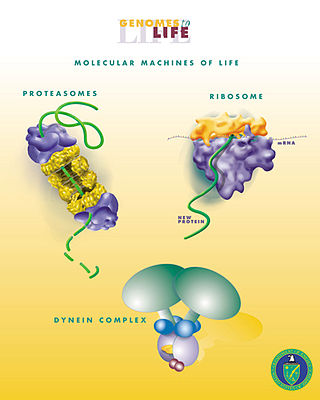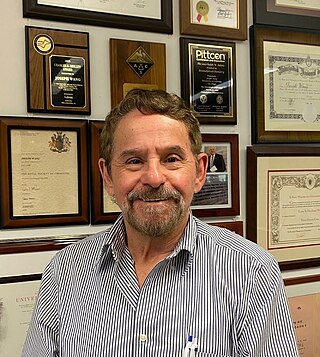Rahul Sarpeshkar is the Thomas E. Kurtz Professor and a professor of engineering, professor of physics, professor of microbiology & immunology, and professor of molecular and systems biology at Dartmouth. Sarpeshkar, whose interdisciplinary work is in bioengineering, electrical engineering, quantum physics, and biophysics, is the inaugural chair of the William H. Neukom cluster of computational science, which focuses on analog, quantum, and biological computation. The clusters, designed by faculty from across the institution to address major global challenges, are part of President Philip Hanlon's vision for strengthening academic excellence at Dartmouth. Prior to Dartmouth, Sarpeshkar was a tenured professor at the Massachusetts Institute of Technology and led the Analog Circuits and Biological Systems Group. He is now also a visiting scientist at MIT's Research Laboratory of Electronics.
Articles related specifically to biomedical engineering include:

John A. Rogers is an American physical chemist and a materials scientist. He is currently the Louis Simpson and Kimberly Querrey Professor of Materials Science and Engineering, Biomedical Engineering, and Neurological Surgery at Northwestern University.
The Harvard–MIT Program in Health Sciences and Technology (HST) is one of the oldest and largest biomedical engineering and physician-scientist training programs in the United States. It was founded in 1970 and is the longest-standing collaboration between Harvard University and the Massachusetts Institute of Technology (MIT). Within the program, graduate and medical students are registered with both MIT and Harvard and may work with faculty and affiliated faculty members from both communities. HST is a part of MIT's Institute for Medical Engineering and Science and forms the London Society at Harvard Medical School.

Biological engineering or bioengineering is the application of principles of biology and the tools of engineering to create usable, tangible, economically viable products. Biological engineering employs knowledge and expertise from a number of pure and applied sciences, such as mass and heat transfer, kinetics, biocatalysts, biomechanics, bioinformatics, separation and purification processes, bioreactor design, surface science, fluid mechanics, thermodynamics, and polymer science. It is used in the design of medical devices, diagnostic equipment, biocompatible materials, renewable energy, ecological engineering, agricultural engineering, process engineering and catalysis, and other areas that improve the living standards of societies.
Mehmet Toner is a Turkish biomedical engineer. He is currently the Helen Andrus Benedict Professor of Surgery at Massachusetts General Hospital (MGH) and Harvard Medical School, with a joint appointment as professor at the Harvard-MIT Division of Health Sciences and Technology (HST).
Utkan Demirci is a tenured professor and a successful serial academic entrepreneur at Stanford University at the departments of Radiology and Electrical Engineering. He served as the Interim Division Chief and Director of the Canary Center at Stanford for Cancer Early Detection in the Department of Radiology.

Joseph Wang is an American biomedical engineer and inventor. He is a Distinguished Professor, SAIC Endowed Chair, and former Chair of the Department of Nanoengineering at the University of California, San Diego, who specialized in nanomachines, biosensors, nano-bioelectronics, wearable devices, and electrochemistry. He also serves as the Director of the UCSD Center for Wearable Sensors and as the co-director of the UCSD Center for Mobile Health Systems and Applications (CMSA).
Bin He is a Chinese American biomedical engineering scientist. He is the Trustee Professor of the Department of Biomedical Engineering, professor by courtesy in the Department of Electrical and Computer Engineering, and Professor of Neuroscience Institute, and was the head of the department of Biomedical Engineering at Carnegie Mellon University. Prior, he was Distinguished McKnight University Professor of Biomedical Engineering and Medtronic-Bakken Endowed Chair for Engineering in Medicine at the University of Minnesota. He previously served as the director of the Institute for Engineering in Medicine and the Center for Neuroengineering at the University of Minnesota. He was the Editor in Chief of the IEEE Transactions on Biomedical Engineering and serves as the editor in chief of IEEE Reviews in Biomedical Engineering. He was the president of the IEEE Engineering in Medicine & Biology Society (EMBS) from 2009 to 2010 and chair of International Academy of Medical and Biological Engineering from 2018 to 2021.
Medidata Solutions is an American technology company that develops and markets software as a service (SaaS) for clinical trials. These include protocol development, clinical site collaboration and management; randomization and trial supply management; capturing patient data through web forms, mobile health (mHealth) devices, laboratory reports, and imaging systems; quality monitor management; safety event capture; and monitoring and business analytics. Headquartered in New York City, Medidata has locations in China, Japan, Singapore, South Korea, the United Kingdom, and the United States.
The IEEE Biomedical Engineering Award is a Technical Field Award of the IEEE given annually for outstanding contributions to the field of biomedical engineering. It was established in 2010.

Jeffrey Karp is a Canadian biomedical engineer working as a Professor of Medicine at Harvard Medical School, Brigham and Women's Hospital, and the principal faculty at the Harvard Stem Cell Institute and Affiliate Faculty at the Massachusetts Institute of Technology through the Harvard–MIT Division of Health Sciences and Technology. He is also an affiliate faculty at the Broad Institute.

Andreas Hierlemann is a German chemist and professor of Biosystems Engineering at ETH Zurich. He is known for his work in the field of CMOS-based chemical and biomicrosensors and high-density microelectrode arrays.
Brian T. Cunningham is an American engineer, researcher and academic. He is a Donald Biggar Willett Professor of Engineering at University of Illinois at Urbana-Champaign. He is a professor of Electrical and Computer Engineering, and a professor of bioengineering.
Carlotta Guiducci is an Italian bio-engineer. Her research is invested in bio-molecular analysis based on lab-on-a-chip devices. She is an Associate Professor at EPFL and head of the Laboratory of Life Sciences Electronics located at EPFL's Lausanne campus.
Kiana Aran is a biomedical entrepreneur and Associate Professor at both UC San Diego's School of Medicine and UC San Diego's Jacobs School of Engineering in the Department of Bioengineering. She is also the Chief Innovation Officer at Paragraf Ltd. Paragraf, a UK-based semi-conductor company, acquired Cardea Bio Inc., which she co-founded and ran as the Chief Science Offer. She has also helped co-found CRISPR QC Inc. that offers a CRISPR Analytics Platform that helps pharma and biotech companies optimize their gene editing research. Her overall research and inventions are focused around developing technologies and bioelectronics for multi-omics studies and applications, especially when they enable products and technologies for studying the mechanisms of healthy aging. She became known as the pioneer of fusing CRISPR and electronics, resulting in the CRISPR-chip technology that is being used to improve the quality of genotyping and gene editing. She was awarded the 2021 Nature – Estée Lauder Research Award for Inspiring Women in Science.
The Wyss Institute for Biologically Inspired Engineering is a cross-disciplinary research institute at Harvard University focused on bridging the gap between academia and industry by drawing inspiration from nature's design principles to solve challenges in health care and the environment. It is focused on the field of biologically inspired engineering to be distinct from bioengineering and biomedical engineering. The institute also has a focus on applications, intellectual property generation, and commercialization.
Catherine M. Klapperich is an American biomedical engineer noted for her research on diagnostics and precision medicine. She is currently a professor of biomedical engineering at Boston University, with additional appointments in materials science & engineering and mechanical engineering. Klapperich serves as the director of research for the DAMP Laboratory at BU. Klapperich was previously the director of the NIH NIBIB Center for Future Technologies in Cancer Care as part of the Point-of Care-Research Technologies Network.

Wei Gao is a Chinese-American biomedical engineer who currently serves as a professor of medical engineering at the California Institute of Technology (Caltech). Gao has been a professor at Caltech since 2017 and is an associate editor of the journals Science Advances, Biosensors and Bioelectronics, npj Flexible Electronics (Nature), Journal on Flexible Electronics (IEEE), and Sensors & Diagnosis.






